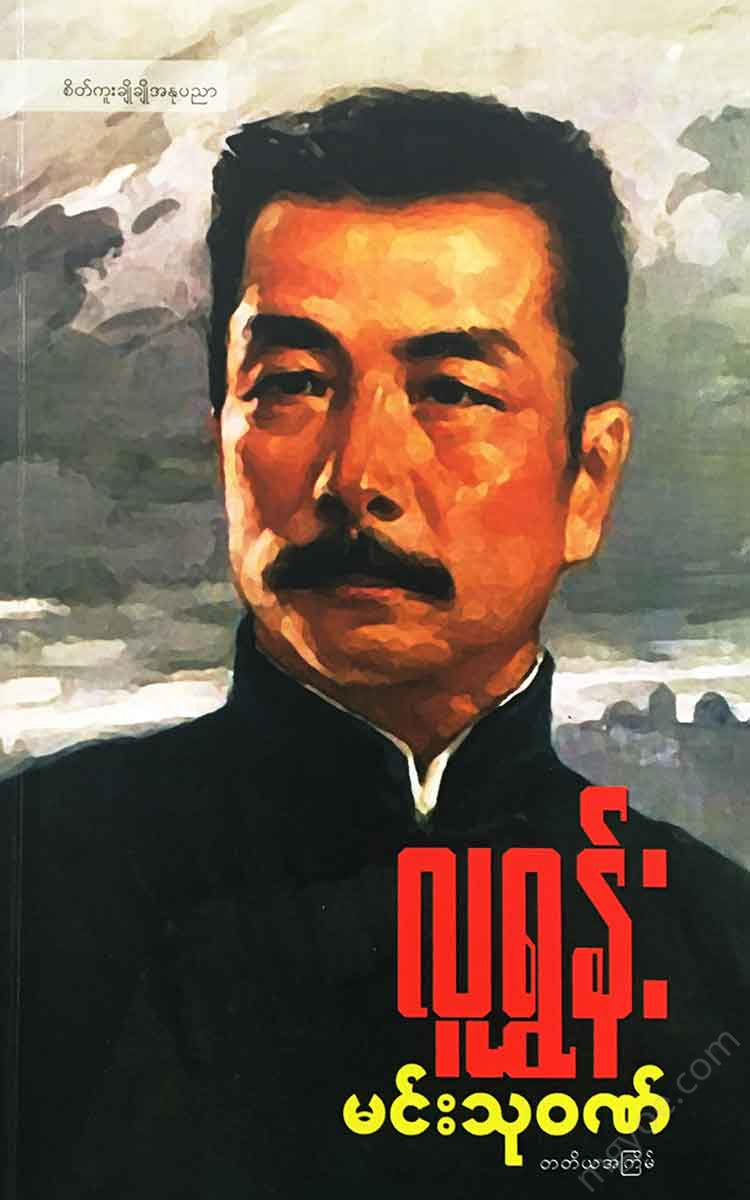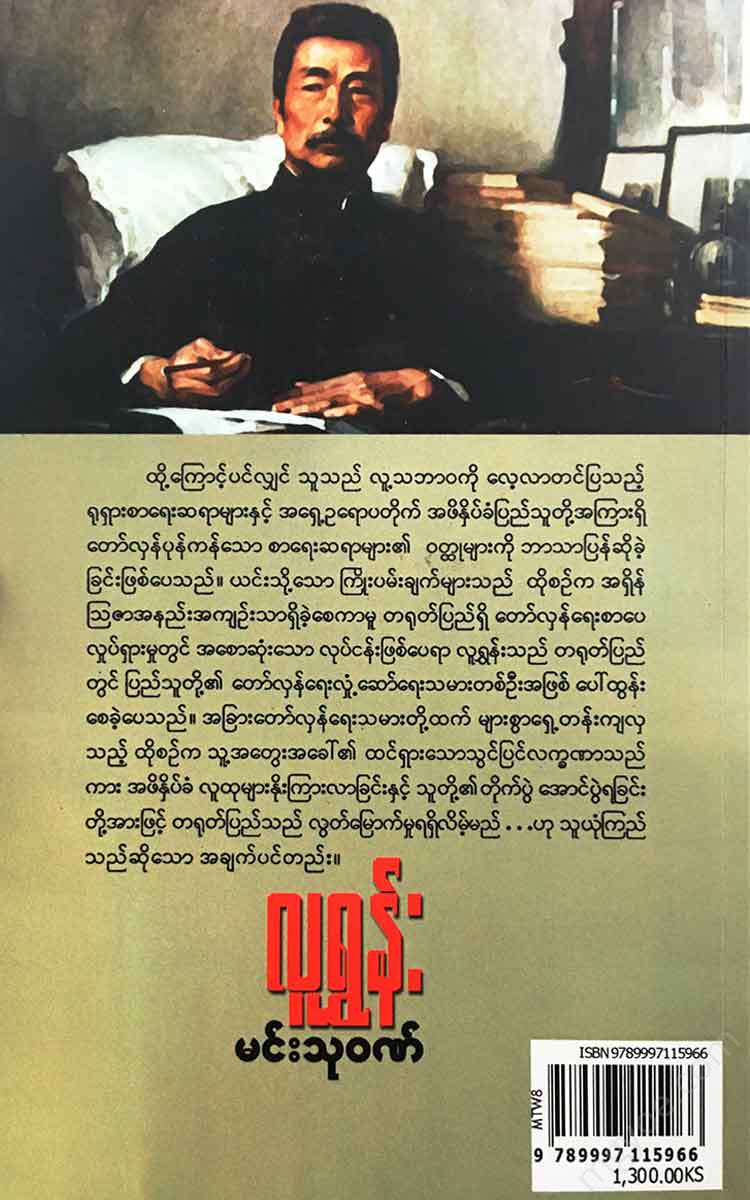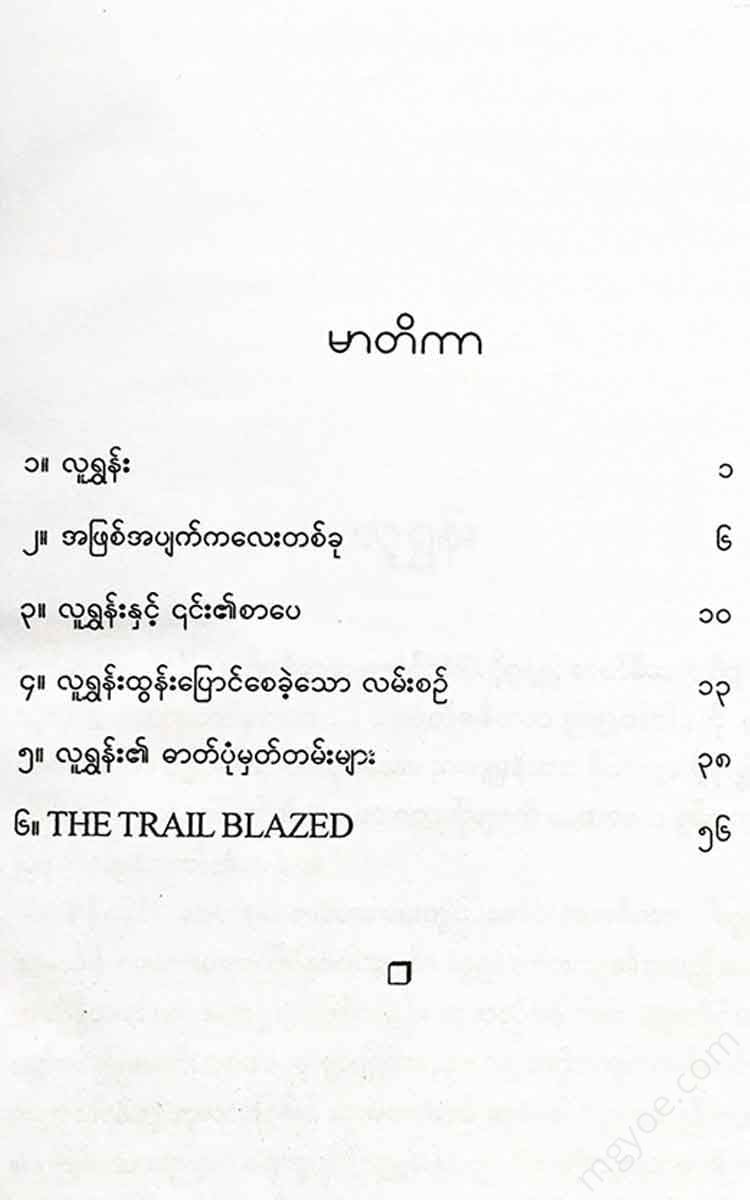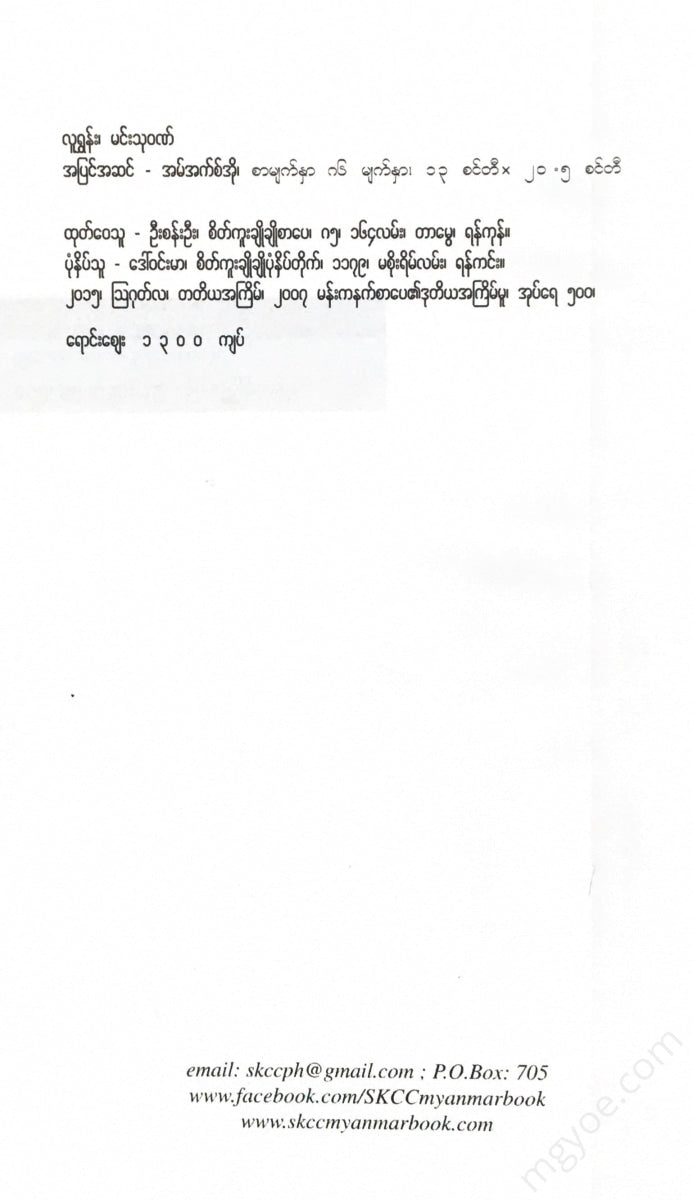စိတ်ကူးချိုချိုစာပေ
Min Thuwan - Lu Rong
Min Thuwan - Lu Rong
Couldn't load pickup availability
Luron
I respectfully pay homage to Sakyamuni, who abandoned the outdated three Vedic systems and preached the modern three Pitakas... who abandoned the outdated Brahmanism and invented modern Buddhism, and I will translate and write with all my might the short stories that are appearing in every saint today...
The leader of the literary movement in the Xintian era was a writer named “Lu Xuan”. Lu Xuan is not his real name, but his real name is Chao Shujin. He was born in 1881 in Shaoxing, Cheqing County, Xintian. His grandfather was a graduate of Hanlin University, and his father was a scholar of Suwei, so Chao Shujin (Lu Xuan) learned poetry and literature from his parents. However, the Chao family was not as wealthy as other scholars. His father died when he was young, so Chao Shujin and his mother had to live in the hands of others. His mother worked hard to send her son to the public schools in Nanjing. Chao Shujin studied maritime science in Nanjing, then transferred to the school of mining and engineering, and received a university degree there. Then, he went to Japan to continue his education as a scholar, receiving government funding.
He studied medicine in Tokyo and returned to China in 1909. He was very disappointed when he was unable to go to Europe to pursue his education. He did not want to make a living from his medical studies, which he could not afford, so he worked as a teacher and taught literature in his native province. When the people of China revolted against the Manchu government in 1911, deposed the Manchu emperor, and established a republic, he happily went to Beijing and joined the circle of intellectuals who were calling for the revival of China.
For 15 years, he devoted himself to general work. He accepted an academic position and taught literature at three universities at once. Among these three universities was Peking National University, which was the birthplace of the revival of Chinese literature.
Here, I will briefly discuss three types of literature that flourished side by side in the country until 1917. (a) The type of literature called Wining, which was popular in ancient times, was a long, stilted, and stilted form of literature that was “full of words and no words.” (b) The type of literature called Pehma, which has emerged in modern times, is a popular and contemporary style of literature that is written in the local dialect and is criticized by Wining scholars.
(c) The third type is a kind of short story literature that is written by the villagers in their own villages. In the Sianty-Tai, the people of the country, who are called by the Burmese as "Letto Letshya", do not understand each other's words. The Winyin literature is too complicated and cannot be learned or understood by ordinary people. The third type of literature is also not understood by people of one region or another. Therefore, a kind of modern literature called "Pe" was written in simple local language so that people of all kinds, whether short or long, could understand it together. Just as the ancient scholars in Burma condemned modern literature as "crazy literature", the ancient scholars in Sianty-Tai also condemned the Pema literature.
At that time, Lu Xun was also editing two magazines, Manyun and Rui Qou. He also translated German, Russian, and Japanese books.
He also wrote for a magazine called “Hla Lin Thit”. In 1917, the magazine “Lul Lin Thit” began to promote the “Pe” literature, and in the future, Pe” literature flourished and flourished throughout the country. At that time, the magazine “Lul Lin Thit” was edited by a wise man named Chin Tu Su. Chin Tu Su was a reformer and a vocal advocate for the use of Pe literature as official and popular literature. Before the publication of the magazine “Lul Lin Thit”, which was written and published exclusively in Pe literature, all Pe literature in the past was published in the traditional style of traditional literature. Of all the “rebellions” that occurred in the country, the Pe literature rebellion of the Pe period was the most important, and the “brush war” that the magazine “Lul Lin Thit” started was the most difficult war of all wars, whether you or me. Gradually, the Burmese armed forces began to attack the old customs and usages inherited from the Manchu government.
This was the beginning of the emergence of critical thinking in every country. The new era of Mingalar, which began to demand reform in matters of religion and nationality, began to emerge like a young sun rising.
The leader of the Pehmar army, Situ Bilu, was Lu Xuan. He was a member of the Chin Tu Su and a bloodthirsty man, and Lu Xuan contributed short articles to the Lu Lin Thit magazine. He also contributed novels such as "Ba Ya Se".
However, when Lu Xun was published in 1921, he was recognized by the whole country for his satirical novel "The Biography of Aqyu", which was published in the year 1921. This novel's plot and writing style were quite unusual for the literary world. In every town and village, people discussed, talked about, and consulted about the biography of Aqyu. The ancient scholars criticized Aqyu. The modern youth praised Aqyu. They fought a "brush war" with Lu Xun as their pillar, and in the end, Lu Xun emerged as a great leader in the literary world of the Peking era.
Since then, the biography of Arqu has been reprinted once a year. Not only that, but scholars have also translated this work into various languages, including French, German, Russian, and Japanese. The great scholar Romain Rollin, also known as the Sheep Sung, who greatly admired Lu Xuan's writings, said that he even shed tears when reading this novel.
However, the officials did not like Lu Xun's writing style. They accused him of disturbing the country and expelled him from the education department. Then, during the reign of dictator Tong Chiji, a warrant was issued for Lu Xun's arrest, so Lu Xun had to escape from Beijing with the help of good friends. This was his first escape from death.
He then spent some time in Amoy, teaching and writing. When President Sun Yat-sen accepted the Communists into the Kuomintang government, Lu Xun moved to Canton. In 1927, when Chiang Kai-shek purged thousands of communists, including students, workers, and peasants, Lu Xun was forced to flee. He fled to Shanghai to escape arrest and went into hiding.
A small incident
( A LITTLE INCIDENT)
It has been six years since I came to the city from the forest. During that time, many political issues have arisen, some of which I have seen and some of which I have heard. But my heart has not been moved by those issues at all. When I think back on those political issues, my heart not only becomes more and more depressed, but my love for the world grows less and less. However, one incident has a profound meaning for me, and I have not forgotten it to this day.
That day was the sixth year of our Republic of Saint-Tropez, a winter day, and a strong north wind was blowing. I had to get up early to go to work because of the beauty of the veranda. However, I did not see anyone on the way to work. After a long search, I found a rickshaw and got in and asked the rickshaw driver to take me to the mountain gate.
After a while, the wind began to calm down and the dust on the road began to settle, so my eyes cleared up. The rickshaw driver also started running quickly. Just as I was about to reach the mountain gate, someone ran in front of me, bumped into the rickshaw and threw me to the ground.
The person who fell was none other than a woman with disheveled hair and ragged clothes. She suddenly ran out of the road and crossed the road in front of us. The rickshaw driver tried to avoid us as much as he could. However, the woman’s loose clothes got caught in the wind and got caught in the wheelbarrow. Fortunately, the rickshaw driver slowed down and saved us. Otherwise, the woman would have fallen over and been seriously injured. Even after we stopped the rickshaw, the woman did not get up from her position and was lying on all fours. I do not think she was injured, because no one saw this rickshaw accident. However, I was very annoyed when I saw the rickshaw driver not only not pulling but also standing there watching. This incident would not only delay my journey but also cause me trouble.
"Hey... keep pulling... it's not enough."
I said to the rickshaw driver. But I don't know if he didn't hear me or if he didn't care. He lowered the cart and gently lifted the woman. Then, holding her, he asked, "Did you get hurt?"
"I got hit"
“I saw you fall...it wasn’t too bad...how could you have been hit? You’re just being so mean, you’re so hateful, the rickshaw driver is just trying to make things worse, you’ll have to deal with it yourself,” I muttered to myself. However, after hearing that the rickshaw driver had been hit, I didn’t hesitate. I took the woman’s arm and carefully led her to the other side of the road. I also looked over and was surprised to see a shack. The rickshaw driver didn’t see anyone outside the shack, so he took the woman inside.
At that moment I felt a strange sensation. For some reason, the body of the rickshaw driver, covered in dust, grew larger and larger in front of me. The further he went, the larger his body grew, until finally I could see him. Inside, I felt as if an invisible force came from where he was and squeezed my body. That invisible force seemed to be pushing out the petty habits hidden under my fur coat. My strength was running out, my blood was congealing, and I was coming weakly. Thus I sat, motionless and motionless, with my eyes closed, until I saw a police officer coming towards me from the gatehouse.
“Rent another rickshaw and go... you rickshaw driver can't go on anymore,” he advised. | Without thinking, I reached into my bag and took out a large handful of copper coins.
"Give me this money to the swindler."
He said.
The north wind has died down, and the road is still clear of people.
I thought as I walked. But it was as if I didn't dare to think about myself. I put aside what had happened and sought an answer for the handful of coins. Why did I give those coins to that swindler? As a reward? As I had thought and mumbled as before, was I still human enough to make a decision about that swindler? I dared not answer my butterfly.
That experience is still fresh in my memory. Every time I think about it, I feel pain. The military, political, and social events that took place during this time are like the poems and literature that I had memorized as a child, but now I can no longer recite a single line. However, the incident that happened to me during those six years has washed me with the water of repentance, corrected my character, and strengthened my hope and courage. I can still see that incident clearly as it happened that morning.







